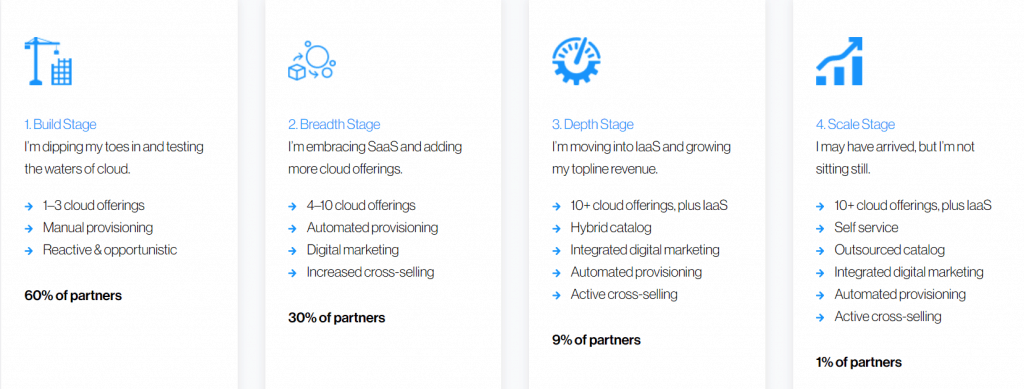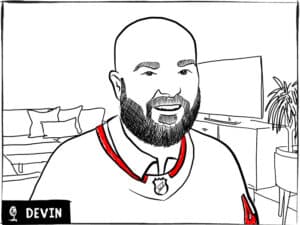Marketing Tactics for MSPs
The most common MSP marketing question I see posted on Reddit, Slack, and Discord, is usually some flavor of: “Which marketing tactics are working for MSPs?” A good question, no doubt. However it’s difficult to answer without knowing a little bit more about the particular MSP and its stage of growth. While some MSPs may have great results from inbound marketing campaigns for example, others would be set-up to fail by utilizing this somewhat costly strategy. There are a lot of factors that go into determining appropriate marketing strategies for MSPs: budget, geography, service catalogue, internal strengths, size of your existing database, etc. Today’s blog contrasts these factors in relation to an MSP’s stage of growth and recommends marketing tactics to be prioritized.
We’ll be using the stages from Ingram Micro’s ‘Cloud Awesomeness Roadmap’ as the growth model:

While this model is specific to cloud offerings, it will serve this blog’s purpose for a broader discussion as well. Research was also sourced from Channele2e’s 5 stage and 6 stage growth models. Now let’s talk marketing tactics:
1. Build Stage
The Build Stage is where most MSPs find themselves (~60%). It’s characterized by limited service offerings, few staff, the founders wearing many hats, a lot of break/fix services, and organizational strengths skewing towards the technical side. Many customers are local SMBs, especially from the founders’ personal networks. Pricing at this stage tends to be below average and MRR low without much cross-selling occurring. Lacking dedicated marketing personnel, many MSPs in the Build Stage benefit from utilizing a one-size-fits-all marketing program. Websites tend to be of the simple WordPress variety, or crafted using a drag-and-drop website builder. Sales materials are simple too, including business cards, brochures product sheets, and checklists. While these aren’t exactly flashy, nor do they set you apart from the competition, they’ll set you up with the pre-requisites for growth and offer good value. The marketing tactics most appropriate for MSPs in the build stage are the basics which aim to improve the effectiveness of personal networking without breaking the bank.
Recommended Marketing Tactics:
|
|
2. Breadth Stage
MSPs who’ve graduated from the Build Stage find themselves in the Breadth Stage. This represents a large minority of MSPs (~30%). These are MSPs whose service catalogue and staff have grown beyond a few. Break/fix still plays a role, but the organization is trying to move towards more managed services, more cloud offerings, with higher prices and increased MRR. Cross selling efforts are limited to email blasts or a basic newsletter. While new customers are still tending to skew towards local SMBs, fewer are going to be from the founders’ personal networks, with more acquired through digital marketing efforts. While Ingram Micro doesn’t recommend blogging until the next stage, there is value in starting blogging efforts in the Breadth stage, even if it’s done infrequently or irregularly. There may be a marketing person or two, but marketing tasks are still scattered among the founders, technical team members, and admin staff too. In the breadth stage, we move from prioritizing marketing tactics whose purpose is to enable one-to-one communications, to tactics that enable one-to-many communications.
Recommended Marketing Tactics:
|
|
3. Depth Stage
Only a small minority of MSPs reach the Depth Stage (~9%). As noted by Ingram Micro, the primary objective at this stage is to grow top line revenue. Ingram Micro also notes that automated provisioning is characteristic of this stage, and we’ll see automation start to play a role on the marketing side as well. The number of employees has grown to dozens, there’s greater specialization amongst all staff, and for the first time there is a dedicated marketing team. New customers are being acquired via marketing efforts targeting a regional area. The journey upmarket begins, and courting larger customers comes along with the need to meet their complex requirements. A hybrid catalogue is adopted to help meet these requirements, with an emphasis on promoting IaaS due to its profitability. We see a shift towards Account Based Marketing (ABM) thinking, with tactics vying to reach multiple decision makers at specific target organizations. A basic marketing automation set-up nurtures leads and promotes cross-selling of services. We also see the beginnings of inbound marketing efforts, with enhanced SEO and regular blogging. Many different varieties of content are produced to provide ammo for marketing automation, SEO, and social media. The Depth Stage is all about selling more stuff to more people, while corresponding marketing tactics utilize automation to achieve the needed scale.
Recommended Marketing Tactics:
|
|
4. Scale Stage
Very few MSPs reach the ultimate Scale Stage (~1%). Here we have large MSPs, offering a complete range of services, with many dozens of employees, and a full-fledged marketing department. While in the Depth Stage we saw the genesis of ABM thinking, in the Scale Stage we’ll see more actual formalized ABM processes. The customer base continues to skew towards larger organizations (enterprise), who have more decision makers and longer sales cycles. The marketing department reacts by customizing messaging for the various groups of decision makers and automating lead nurturing via advanced marketing automation. There’s a greater degree of competition among MSPs trying to sell into these high-ticket organizations, as there’s only so many of them. A broader region is targeted to reach more of these larger organizations and the MSPs themselves may have multiple regional or national office locations. For the first time, branding becomes particularly important, as there’s a strong need to differentiate amongst the competition, many of whom are pitching similar services. The marketing tactics at the Scale Stage showcase what’s different about a brand, while targeting specific people at specific organizations.
Recommended Marketing Tactics:
|
|
The next time I see someone on social media asking about the best marketing tactics for MSPs, please forgive me if I’ve taken the liberty to link them to this post. Often the person who is posing the question is hoping for a magic bullet. But good MSP marketing is multi-faceted. While not every MSP needs to adopt every marketing tactic I’ve recommended, I hope I’ve provided some good food for thought as you plan your MSP’s next marketing moves.
Want our thoughts on your particular MSP’s marketing priorities? Contact us today.
Posted April 2, 2020
Categories: Business Growth
Tags: B2B business growth, Marketing Tactics, msp
